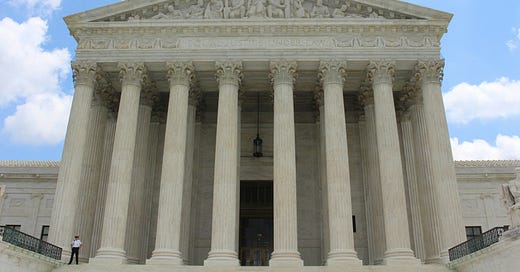While researching the final lines of today’s first reading, which relate which Jewish laws Gentiles had to follow and which they didn’t, I came across an interesting article, Why Acts 15 Led Me to the Catholic Church:
There was a theological question/issue on the table, and while Paul and Barnabas believed the Judaizers were in error, it seemed that a definitive resolution was required. As far as Scripture is concerned, Jesus never said anything definitive about this issue, nor had the Apostles prior to the Council. And—very oddly for someone like myself who was taught sola scriptura—it seemed that everyone was assuming that a definitive decision could only be rendered by a living authority. They didn’t say “let’s attempt to interpret Scripture for ourselves on this point.” They didn’t even appeal to the apostolic authority of Paul himself, but rather to a decision by a seemingly higher authority—the living authority of the Church as a whole.
I never thought about that before—even scripture doesn’t support sola scriptura.
Reading 1
Acts 15:7-21
After much debate had taken place, Peter got up and said to the Apostles and the presbyters, "My brothers, you are well aware that from early days God made his choice among you that through my mouth the Gentiles would hear the word of the Gospel and believe. And God, who knows the heart, bore witness by granting them the Holy Spirit just as he did us. He made no distinction between us and them, for by faith he purified their hearts. Why, then, are you now putting God to the test by placing on the shoulders of the disciples a yoke that neither our ancestors nor we have been able to bear? On the contrary, we believe that we are saved through the grace of the Lord Jesus, in the same way as they."
The whole assembly fell silent, and they listened while Paul and Barnabas described the signs and wonders God had worked among the Gentiles through them.
After they had fallen silent, James responded, "My brothers, listen to me. Symeon has described how God first concerned himself with acquiring from among the Gentiles a people for his name. The words of the prophets agree with this, as is written:
After this I shall return and rebuild the fallen hut of David; from its ruins I shall rebuild it
and raise it up again, so that the rest of humanity may seek out the Lord, even all the Gentiles on whom my name is invoked. Thus says the Lord who accomplishes these things, known from of old.
It is my judgment, therefore, that we ought to stop troubling the Gentiles who turn to God, but tell them by letter to avoid pollution from idols, unlawful marriage, the meat of strangled animals, and blood. For Moses, for generations now, has had those who proclaim him in every town, as he has been read in the synagogues every sabbath."
Peter is alluding to a passage of Acts that we skipped over,1 in which a Roman centurion named Cornelius had a vision of an angel, who told him to summon Peter to his house.
Meanwhile, Peter had a vision of “unclean” animals, which a voice from Heaven told him to eat. Peter at first refuses, because the animals are unclean, but the voice says, “What God has made clean, you are not to call profane.”
Even as Peter is trying to figure out what this means, Cornelius’ men show up to bring him back to his home in Caesarea. Peter puts two and two together, and figures out “God shows no partiality. Rather, in every nation whoever fears him and acts uprightly is acceptable to him.”2 At that point, he baptized the whole household.
All of which is to say, Peter and Paul both had miraculous experiences with Gentiles. It’s clear to them that God is welcoming to all, so long as they accept Jesus.
This still includes some restrictions, which are part of the moral law—no worshipping idols; “unlawful marriage” refers to things like incest. The blood stuff was more contextual, to not scandalize Jews, who found eating meat with blood particularly abhorrent.3 You can still have a rare steak, if you want.
Responsorial Psalm
Ps 96:1-2a, 2b-3, 10
R. Proclaim God's marvelous deeds to all the nations.
Sing to the LORD a new song;
sing to the LORD, all you lands.
Sing to the LORD; bless his name.
R. Proclaim God's marvelous deeds to all the nations.
Announce his salvation, day after day.
Tell his glory among the nations;
among all peoples, his wondrous deeds.
R. Proclaim God's marvelous deeds to all the nations.
Say among the nations: The LORD is king.
He has made the world firm, not to be moved;
he governs the peoples with equity.
R. Proclaim God's marvelous deeds to all the nations.
The point of this Psalm isn’t to say YHWH is greater than other gods; it’s not bragging, it’s welcoming. The Church is inclusive, and wants to include everyone in praising God.
Alleluia
Jn 10:27
R. Alleluia, alleluia.
My sheep hear my voice, says the Lord;
I know them, and they follow me.
R. Alleluia, alleluia.
Jesus knows you. Think about that. That’s why we can pray, and hear His voice; He hears ours first.
Gospel
Jn 15:9-11
Jesus said to his disciples: "As the Father loves me, so I also love you. Remain in my love. If you keep my commandments, you will remain in my love, just as I have kept my Father's commandments and remain in his love.
"I have told you this so that my joy might be in you and your joy might be complete."
There are commandments, and then there are commandments. The ones we commonly know, like the Ten Commandments, are usually moral laws,4 laws about right behavior that exist in all times and places. Then, there are laws pertaining to the Temple and in the Kingdom,5 which, you know, don't exist anymore. Fr. Mike explains it pretty well--
Jesus modified the Mosaic law in several places, sometimes lifting restrictions, sometimes placing even tighter demands on us. But overall, Jesus wants us to love one another, just as He loves us.
So if you’re ever confused about which “law” He means, there’s your reference point.
A strangled animal, like a bird caught in a snare, would still have its blood in it, so Jews still had to drain the blood before eating.
Or “apodictic.”
“Casuistic.”





